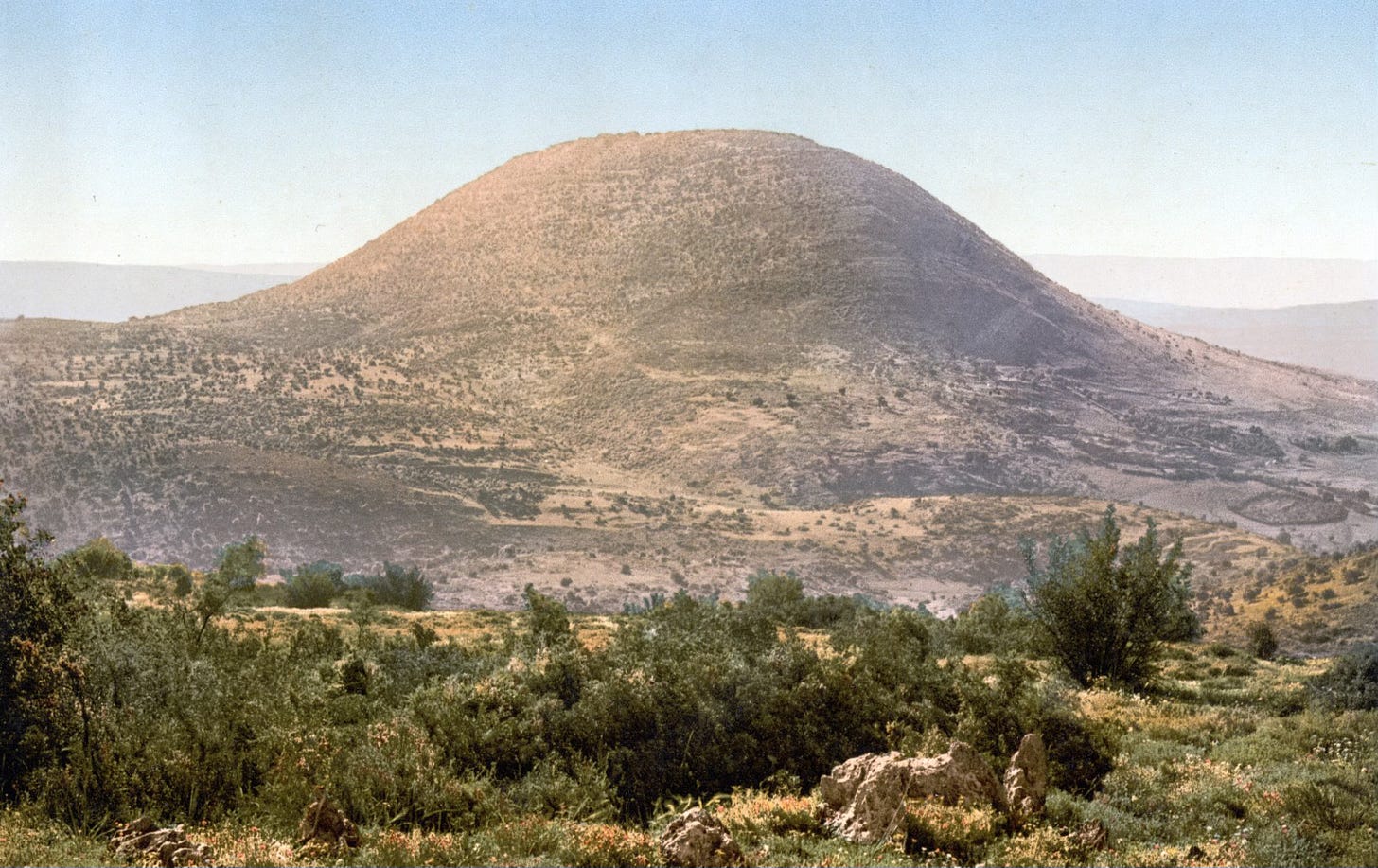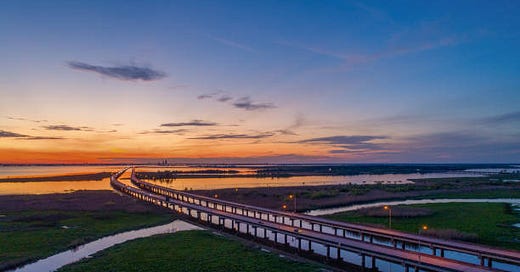
It May Not Have Been Prudent to Run Down Mount Tabor in a Thunderstorm, but at Least I Got a Homily Out of It
2nd Sunday of Lent
The event in today’s Gospel of the Transfiguration took place on Mount Tabor. As it happens, I’ve been to Mount Tabor, and while I didn’t behold the glory that Peter, James, and John did in seeing Christ shining with the light of his divinity, my experience was still memorable enough to tell you about it.
When you arrive at Mount Tabor, you have to make a decision. Busses cannot drive to the top of the mountain because of the steep and sharp switchbacks going up and there being no place at the top for the bus to turn around. You can either choose to hike the two-mile road on foot or hire a taxi to shuttle you up and back down. We were visiting in winter, and it happened to be a remarkably warm and clear day for the season. We opted to hike, and the view going up of the surrounding valleys was well-worth the effort. After having Mass in the Church of the Transfiguration at the summit, out of nowhere a front blew in, and we suddenly found ourselves in the middle—truly in the middle—of a thunderstorm. The thunder and lightning was the most extreme I had ever seen that close-up. The wind and rain blew so hard into the church that we struggled to keep the large, wooden doors shut to stay dry and warm inside.
After a while of this, we had another decision to make. We could either wait the storm out, for however long that would take, and then make the descent in the dark. Or we could make a run for it. It might not instill much confidence in you to know that 40 future priests chose the more dangerous route, but we all lived to tell the tale. What started out as a brisk walk turned into a light jog which ended in a full-out sprint down the switchbacks all the way back to the bus.
I don’t remember all of my thoughts as we ran down the side of the mountain, but now being a handful of years away from it, I would like to think I thought of my experience in relation to what Peter, James, and John felt as they came down from Mount Tabor with Jesus. What happened up on the mountain, for them, changed reality as they knew it. For me, a clear, sunny day became the opposite; for them, the rabbi who they followed, who they believed to be the Messiah and even the Son of God, now in no uncertain terms revealed to them that he must suffer, die, and rise from the dead. This wasn’t their understanding of what God was supposed to do, to set his people free from sin and oppression. Upon the mountain top, the apostles are terrified and coming down they are confused. It would only be in the light of what Christ would do in the coming days—what would happen to him in Jerusalem at the hands of Pontius Pilate—that any of what happened on Tabor would make sense. Then, they would understand what ‘rising from the dead’ meant; then they would understand why Jesus had to die at all.
I will confess to you that I wrote this exact sentence I’m speaking to you right now at 6:09 this morning. Under normal circumstances, I don’t like to write my homilies quite so under the gun; but yesterday afternoon I gave a version of this homily to our parish’s Confirmation candidates on retreat, and what started out as a half-baked riff on something that happened to me on a trip to Israel developed into something I thought worth sharing with the rest of you. So, I decided to scrap the homily I had nearly finished to write this.
What I told the kids yesterday is that, in life you are guaranteed to have at least three kinds of experiences: experiences that are beautiful, experiences that are scary, and experiences that are confusing. They are facts of life. Some moments will be overwhelming in their beauty like the glory of Jesus shining forth in its splendor on Tabor. Some will be scary like running down a mountain through a thunderstorm. Some will be confusing, like the apostles trying to make sense of why their friend has to die or, even more to the point, why Abraham was told to kill his only son Isaac. Beautiful, scary, and confusing moments are guaranteed to come—and they might come all in one day or all in one instant. The question, for people of Christian faith, is whether or not we will look for God in them.
One of the team members shared with the Confirmation candidates a powerful and vulnerable testimony of finding God in the wake of her father’s sudden death, a death she witnessed. Where it clicked for her was the realization that ‘God suffers with us’, and this is exactly the teaching of Saint Paul to the Romans: “If God is for us, who can be against us?” God is for us—and he is for us in every possible way and, thus, there to be found in every possible experience: in the beautiful, the scary, the confusing, the tragic, the harrowing, and everything in between. The light that shines forth from Christ’s divinity through his humanity upon Tabor is able to reach every single experience we have throughout our lives and, thus, able to render any experience a moment of Transfiguration: where we no longer see the merely human but, in the human, see the radiant light of the divine.
As Christians, we carry within ourselves the capacity to see any moment through the lens of Mount Tabor, because we bear within us the Holy Spirit, who leads us to find Christ even where he is most hidden. The Christian life on the whole, but especially the life of prayer, is about following the Spirit’s lead to see where Christ is present within our experiences and, thus, there revealing to us to the glory of God. It is only in the light of Christ that the mystery of our existence—in whole and in part—makes sense. We have now what the apostles coming down the mountain did not: the certainty that Christ ‘by dying destroyed our death and by rising restored our life’, the certainty that he is “for us” in every possible way.
The Church always reads the Gospel of the Transfiguration on the Second Sunday of Lent because tradition holds that this event took place 40 days before the events of Jesus’ Passion. If Tabor leads to Calvary, and every Mass is a continuation of what happened upon Calvary, then every Mass should lead us back also to Tabor. In every Mass, we are reminded of God’s radical being “for us” by coming into the world once again in the smallest, most inscrutable way: dwelling in a tiny Host. If God can be present—really, fully present and alive—in something so small, can he not be just as present and alive in our every experience, great or small, beautiful, scary or confusing? The Eucharist is our constant reminder of God being “for us” and, by consequence, nothing can be “against us”. God is “for us” in the Host and in all things. The Sacrament of his true, real, abiding, and loving presence ought to increase our faith and hope in his true, real, abiding, and loving presence in every corner of our lives. In the Eucharist, as on Tabor, the Father’s voice is heard: “This is my beloved Son. Listen to him.”











